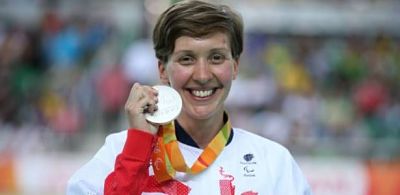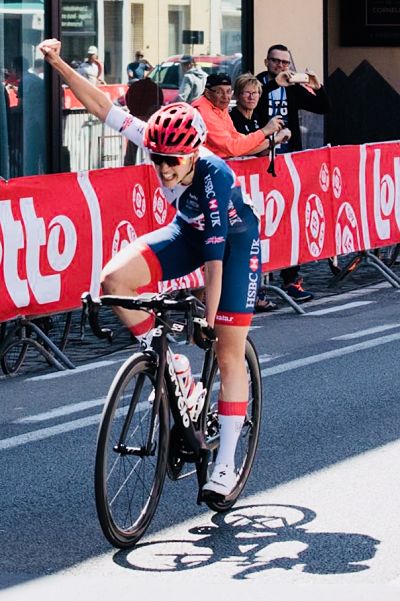Paralympian Crystal Lane-Wright only took up competitive cycling when she was 24 but she's since won a World Championship title, silver and bronze medals at the Rio Games, and is one of Team GB's top medal contenders for the upcoming Paralympics.
We were keen to hear more about Crystal's preparations for Tokyo after she reached out to Precision Fuel & Hydration to book a one-to-one video call to discuss her hydration strategy...
Hi Crystal, first of all, can you tell us how you went from starting out in competitive cycling at the age of 24 to a multiple-medal winning athlete...
I became a cyclist by pure luck!
I had just started a degree in Sports Science at Exeter and it was around this time that UK Sport launched a 'Girls for Gold' scheme which I came across online.
I signed up with the sole intention of just getting my face seen as I wanted to become a Sports Physiologist. I was invited to try out with British Rowing & Cycling and the rest is history.
The pursuit, time-trial and road race are genuine medal opportunities for you in Tokyo, but how has the postponement of the Paralympics to 2021 affected your chances of success?
I actually caught coronavirus back in March so when the Games were delayed my initial reaction was relief as I'd lost almost a month of training and I wasn't in the shape I wanted to be.
I've never missed so much training before so the fight back to fitness during a lockdown has been tough but I can take a lot of confidence - both in how I applied myself and how my coach has got me back to where I was (and now even better).

Oh wow, we're pleased to see you've made a strong recovery! Now you're back to full fitness, what's a typical week of training looking like for you?
I'm on the bike an average of 16-20 hours per week during the winter.
There will be a focus on heat acclimation to prepare for conditions in Tokyo, so I will use a combination of a heat chamber here in the UK and base myself in southern Spain mid-summer 2021 to achieve this.
Dehydration could have a significant effect on my performance during racing and recovery between races and so that's why I've teamed up with Precision Fuel & Hydration to avoid this.
Crystal's top 3 tips for using winter training to prepare for hot conditions:
1. Wear lots of clothing when you're out on the road. I actively try to overdress so I keep a high core temperature when riding.
2. Ditch the fan when on the turbo. I started this at the end of a hot summer with the aim of getting used to "feeling' hot. I haven't found it effects my power numbers but I do have a much higher HR. This is something that's taken a while to adjust to.
3. Take a hot bath immediately after training to keep your core temperature high for as long as possible. Try to submerge your body and neck in the water as that has been shown in studies to help keep the temperature high.
I understand you first came across us when you booked in for a call about your hydration strategy with Sean...
I found Precision Fuel & Hydration during a Google Search after chatting to a teammate who highly recommended a Sweat Test. I'd recently been to Japan and experienced first-hand how hot and humid it can be which got me thinking about the fact that the one area of performance I'd overlooked was hydration.
I was impressed with Sean's generosity, knowledge and the time he took to explain the importance of correct hydration and how I can use Sweat Test data to my advantage.
You've since had an Advanced Sweat Test with Andy Brodziak at our Precision Fuel & Hydration Sweat Test Centre in Harrogate and I wondered how you'll take what you've learned from your test into your training and racing?
I learned from my Sweat Test that I'm a relatively low salt sweater but even on the lower end of the scale my current rehydration tabs didn't contain enough sodium to replenish enough of what I was losing.
I also learned that what you do the night before a race or an important training session can have an impact.
Once a week I have a very hard double-day and that first session of the day is a turbo interval session where I don't use a fan, so I sweat a lot.
I've noticed immediately how preloading the night before with PH 1500 - as well as using PH 1000 during the session - makes me feel much better for that second session of the day, which is a long endurance ride.
Correct hydration is key to my training and racing preparation now in any environment.
Find a Sweat Test Centre near you.

You'll have to be quite flexible with your hydration strategy for Tokyo as you've got both the 60km road race and the shorter individual pursuit event to look forward to...
Exactly, the 60km road race requires refuelling and rehydrating on the move during the race itself. Tokyo is hilly and I can only hold so much fluid on my bike at one time so collecting bottles from the side of the road is essential.
The environment during the road race is unpredictable and also uncontrollable. It could be as hot as 34°C (93.2°F) with 80% humidity which will require high fluid intake and an increase in carbohydrate intake.
The individual pursuit is an event that's only around 210 seconds but there are two in a day and my schedule in Japan allows only a 90-minute window between the qualifier and final, so recovery between the two races is key.
The environment in a track is controlled as it's air-conditioned but for racing to be fast, a warm environment of 28°C (82.4°F) is ideal so it will still be hot inside and I could be there for several hours.
And what will a perfect race-day breakfast look like for you in Tokyo?
It has to be something I really enjoy and also looks good. Breakfast is easily my favourite meal of the day.
But on race day, breakfast can feel like the hardest thing to eat due to nerves. I like to start the day with oats as they are full of slow release energy which is important.
It needs to be gentle on the gut too so I prefer to use a non-dairy milk like almond milk and I avoid foods high in protein and fat as I mostly use carbohydrates as my fuel during races.
I like my food to look appetising so I add a banana and seasonal fruit to my bowl and some peanut butter as I love it.
If I'm travelling for a race, then I have these ingredients mixed together the night before and make overnight oats. If I'm at home or a hotel then I'll have oats as porridge.
After a long sleep I wake up dehydrated so it's important to rehydrate with 500ml water and a PH 1000. A coffee with breakfast is good for morale but I don't tend to have too much as I know that 90 minutes before I race, I'll be having large amounts of caffeine in a pre-race gel.